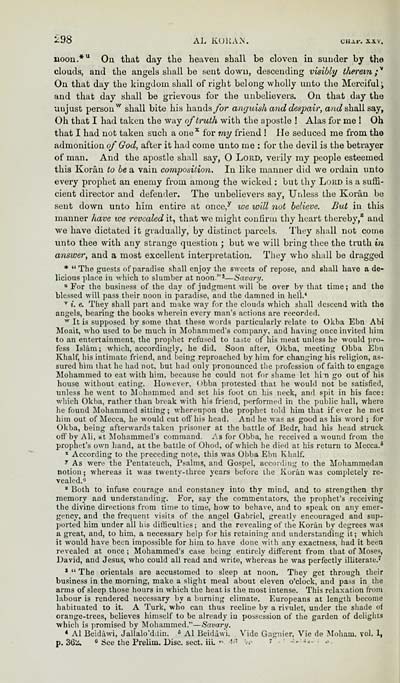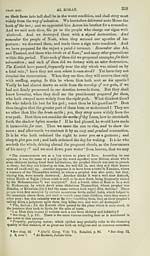Download files
Complete book:
Individual page:
Thumbnail gallery: Grid view | List view

^98 AL KOUAN. CHAf. Xiv.
uoou.*"* On that day the heaven shall be cloveu in sunder by the
clouds, and the angels shall be sent dowu, descending visibly therein;^
On that day the kingdom shall of right belong wholly unto the Merciful i
and that day shall be grievous for the unbelievers. On that day the
unjust person^ shall bite his hands ybr anguish and despair, a?ic/ shall say,
Oh that I had taken the way of truth with the apostle ! Alas for me ! Oh
that I had not taken such a one^ for my friend ! lie seduced me from the
admonition of God, after it had come unto me : for the devil is the betrayer
of man. And the apostle shall say, O Lord, verily my people esteemed
this Koran to be a vain composition. In like manner did we ordain unto
every prophet an enemy from among the wicked : but thy Lord is a suffi-
cient director and defender. The unbelievers say, Unless the Koran be
sent dowu unto him entire at once/ we will not believe. But in this
manner have we revealed it, that we might confirm thy heart tliereby,^ and
we have dictated it gradually, by distinct parcels. They shall not come
unto thee with any strange question ; but we will bring tliee the truth in
answer, and a most excellent iuterjiretation. They who shall be dragged
* "The guests of paradise shall enjoy the sweets of repose, and shall have a de-
licious place in which to slumber at noon."' — Savary.
" For the business of the day of judgment will be over by that time ; and the
blessed will pass their noon in paradise, and the damned in hell.*
"" i. e. They shall part and make way for the clouds which shall descend with the
angels, bearing the books wherein every man's actions are recorded.
"^ It is supposed by some that these words particularly relate to Okba Ebn Abi
Moait, who used to be much in Mohammed's company, and having once invited him
to an entertainment, the prophet refused to taste of his meat unless he would pro-
fess Islam; which, accordingly, he did. Soon after, Okba, meeting Obba Ebn
Khalf, his intimate friend, and being reproached by him for changing his religion, as-
sured him that he had not, but had only pronounced tlie jirofession of faith to engage
Mohammed to eat with him, because he could not for shame let bin go out of his
house without eating. However, Obba protested that he would not be satisfied,
unless he went to Mohammed and set his foot on his neck, and spit in his face:
wliich Okba, rather than break with his friend, performed in the public hall, where
he found Mohammed sitting ; whereupon the prophet told him that if ever he met
him out of Mecca, he would cut off his head. And he was as good as his word ; for
Okba, being afterwards taken prisoner at the battle of Bedr, had his head struck
off by Ali, wt Mohammed's command. 2\s for Obba, he received a wound from the
prophet's own hand, at the battle of Ohod, of which he died at his return to Mecca.*
^ According to the preceding note, this was Oliba Ebn Khalf.
y As were the Pentateuch, Psalms, and Gospel, according to the Mohammedan
notion ; whereas it was twenty-three years before the Koran was completely re-
vealed. «
* Both to infuse courage and constancy into thy mind, and to strengthen thy
memory and understanding. For, say the commentators, the prophet's receiving
the divine directions from time to time, how to behave, and to speak on any emer-
gency, and the frequent visits of the angel Gabriel, greatly encouraged and sup-
ported him under all his ditficulties; and the revealing of the Koran by degrees was
a great, and, to him, a necessary help for his retaining and understanding it; which
it would have been impossible for him to have done with any exactness, had it been
revealed at once ; Mohammed's case being entirely different from that of Moses,
David, and Jesus, who could all read and write, whereas he was perfectly illiterate.^
* " The orientals are accustomed to sleep at noon. Tiiey get through their
business in the morning, make a slight meal about eleven o'clock, and pass in the
arms of sleep those hours in which the heat is the most intense. This relaxation from
labour is rendered necessary by a burning climate. Europeans at length become
habituated to it. A Turk, who can thus recline by a rivulet, under the shade ot
orange-trees, believes himself to be already in possession of the garden of delight-s
which is promised by Mohammed." — Savary.
* Al Beidawi, Jallalo'ddin. * Al Beidawi. Vide Gagnier, Vie de Moham. vol. 1,
p. 36:i. « See the Prelim. Disc. sect, iiu '^ l- ■•■,■■ ^ ■ ' ---''<- • .■'.
uoou.*"* On that day the heaven shall be cloveu in sunder by the
clouds, and the angels shall be sent dowu, descending visibly therein;^
On that day the kingdom shall of right belong wholly unto the Merciful i
and that day shall be grievous for the unbelievers. On that day the
unjust person^ shall bite his hands ybr anguish and despair, a?ic/ shall say,
Oh that I had taken the way of truth with the apostle ! Alas for me ! Oh
that I had not taken such a one^ for my friend ! lie seduced me from the
admonition of God, after it had come unto me : for the devil is the betrayer
of man. And the apostle shall say, O Lord, verily my people esteemed
this Koran to be a vain composition. In like manner did we ordain unto
every prophet an enemy from among the wicked : but thy Lord is a suffi-
cient director and defender. The unbelievers say, Unless the Koran be
sent dowu unto him entire at once/ we will not believe. But in this
manner have we revealed it, that we might confirm thy heart tliereby,^ and
we have dictated it gradually, by distinct parcels. They shall not come
unto thee with any strange question ; but we will bring tliee the truth in
answer, and a most excellent iuterjiretation. They who shall be dragged
* "The guests of paradise shall enjoy the sweets of repose, and shall have a de-
licious place in which to slumber at noon."' — Savary.
" For the business of the day of judgment will be over by that time ; and the
blessed will pass their noon in paradise, and the damned in hell.*
"" i. e. They shall part and make way for the clouds which shall descend with the
angels, bearing the books wherein every man's actions are recorded.
"^ It is supposed by some that these words particularly relate to Okba Ebn Abi
Moait, who used to be much in Mohammed's company, and having once invited him
to an entertainment, the prophet refused to taste of his meat unless he would pro-
fess Islam; which, accordingly, he did. Soon after, Okba, meeting Obba Ebn
Khalf, his intimate friend, and being reproached by him for changing his religion, as-
sured him that he had not, but had only pronounced tlie jirofession of faith to engage
Mohammed to eat with him, because he could not for shame let bin go out of his
house without eating. However, Obba protested that he would not be satisfied,
unless he went to Mohammed and set his foot on his neck, and spit in his face:
wliich Okba, rather than break with his friend, performed in the public hall, where
he found Mohammed sitting ; whereupon the prophet told him that if ever he met
him out of Mecca, he would cut off his head. And he was as good as his word ; for
Okba, being afterwards taken prisoner at the battle of Bedr, had his head struck
off by Ali, wt Mohammed's command. 2\s for Obba, he received a wound from the
prophet's own hand, at the battle of Ohod, of which he died at his return to Mecca.*
^ According to the preceding note, this was Oliba Ebn Khalf.
y As were the Pentateuch, Psalms, and Gospel, according to the Mohammedan
notion ; whereas it was twenty-three years before the Koran was completely re-
vealed. «
* Both to infuse courage and constancy into thy mind, and to strengthen thy
memory and understanding. For, say the commentators, the prophet's receiving
the divine directions from time to time, how to behave, and to speak on any emer-
gency, and the frequent visits of the angel Gabriel, greatly encouraged and sup-
ported him under all his ditficulties; and the revealing of the Koran by degrees was
a great, and, to him, a necessary help for his retaining and understanding it; which
it would have been impossible for him to have done with any exactness, had it been
revealed at once ; Mohammed's case being entirely different from that of Moses,
David, and Jesus, who could all read and write, whereas he was perfectly illiterate.^
* " The orientals are accustomed to sleep at noon. Tiiey get through their
business in the morning, make a slight meal about eleven o'clock, and pass in the
arms of sleep those hours in which the heat is the most intense. This relaxation from
labour is rendered necessary by a burning climate. Europeans at length become
habituated to it. A Turk, who can thus recline by a rivulet, under the shade ot
orange-trees, believes himself to be already in possession of the garden of delight-s
which is promised by Mohammed." — Savary.
* Al Beidawi, Jallalo'ddin. * Al Beidawi. Vide Gagnier, Vie de Moham. vol. 1,
p. 36:i. « See the Prelim. Disc. sect, iiu '^ l- ■•■,■■ ^ ■ ' ---''<- • .■'.
Set display mode to: Large image | Transcription
Images and transcriptions on this page, including medium image downloads, may be used under the Creative Commons Attribution 4.0 International Licence unless otherwise stated. ![]()
| Early Gaelic Book Collections > J. F. Campbell Collection > Koran: or, Alcoran of Mohammed > (452) |
|---|
| Permanent URL | https://digital.nls.uk/77139067 |
|---|
| Description | Volumes from a collection of 610 books rich in Highland folklore, Ossianic literature and other Celtic subjects. Many of the books annotated by John Francis Campbell of Islay, who assembled the collection. |
|---|
| Description | Selected items from five 'Special and Named Printed Collections'. Includes books in Gaelic and other Celtic languages, works about the Gaels, their languages, literature, culture and history. |
|---|

